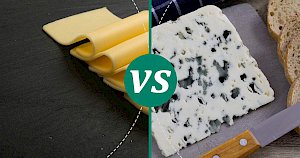Blue Cheese vs Gouda Cheese: Nutrition, Calories & Protein Compared


Blue cheese vs Gouda cheese
Nutrition Facts
Serving size:
change
5g10g15g20g30g40g50g60g80g100g120g140g160g180g200g220g250g300g350g400g450g500g600g700g800g900g1000g
1oz2oz3oz4oz5oz6oz7oz8oz10oz12oz15oz20oz25oz30oz35oz40oz50oz
Amount Per Serving:
Serving size:
change
5g10g15g20g30g40g50g60g80g100g120g140g160g180g200g220g250g300g350g400g450g500g600g700g800g900g1000g
1oz2oz3oz4oz5oz6oz7oz8oz10oz12oz15oz20oz25oz30oz35oz40oz50oz
Amount Per Serving:
Blue Cheese vs Gouda Cheese 100g Compare
| per 100g | Blue cheese | Gouda cheese |
|---|---|---|
| Calories | 353 | 356 |
| Carbohydrates | 2.34 g | 2.22 g |
| Fat | 28.74 g | 27.44 g |
| Protein | 21.4 g | 24.94 g |
| Water | 42.41 g | 41.46 g |
| Calcium | 528 mg | 700 mg |
| Iron | 0.31 mg | 0.24 mg |
| Magnessium | 23 mg | 29 mg |
| Phosphorus | 2.4 mg | 2.3 mg |
| Potassium | 256 mg | 121 mg |
| Sodium | 1146 mg | 819 mg |
| Zink | 2.4 mg | 2.3 mg |
| Vitaminium A | 721 µg | 563 µg |
| Vitaminium B1 (Thiamine) | 0.029 mg | 0.03 mg |
| Vitaminium B2 (riboflavin) | 0.382 mg | 0.334 mg |
| Vitaminium B3 (Niacin) | 1.016 mg | 0.063 mg |
| Vitaminium B6 | 0.166 mg | 0.08 mg |
| Vitaminium B9 (Folic acid) | 0.036 mg | 0.021 mg |
| Vitaminium E | 0.25 mg | 0.24 mg |
| Vitaminium K | 0.002 µg | 0.002 µg |
Discover the Rich Flavors and Nutritional Profiles of Blue Cheese and Gouda
When it comes to cheese, each variety brings its own unique taste, texture, and nutritional benefits to the table. Blue cheese and Gouda are no exceptions, offering distinct flavors that can elevate any meal. But beyond their delicious taste, how do these cheeses compare in terms of nutrition? Let’s dive into the fascinating world of blue cheese and Gouda to discover what makes them stand out.
A Closer Look at Blue Cheese
Blue cheese is renowned for its sharp, salty flavor and distinctive blue veins, a result of the penicillium mold that gives the cheese its character. It's a cheese that polarizes; you either love it or you don't. But there's more to blue cheese than just its bold flavor. Nutritionally, it packs a punch with high levels of calcium and protein, making it a good choice for bone health and muscle maintenance. It contains 353 calories per 100 grams, along with 21.4 grams of protein and 28.74 grams of fat, making it a rich, indulgent option for cheese lovers.
Gouda’s Gentle Appeal
On the other side of the cheese board, Gouda presents a creamy, mild flavor that becomes more complex as it ages. Originating from the Netherlands, this cheese has a smooth texture that makes it incredibly versatile. Gouda is slightly higher in calories than blue cheese, with 356 calories per 100 grams, but it compensates with a higher protein content of 24.94 grams. Its rich calcium content, at 700 mg, surpasses that of blue cheese, offering a substantial benefit for bone health.
Nutritional Nuances That Matter
While both cheeses are excellent sources of calcium and protein, they have their differences in nutritional profiles. Blue cheese contains more sodium (1146 mg) compared to Gouda (819 mg), which is something to consider if you’re watching your salt intake. However, blue cheese is slightly lower in cholesterol (75 mg) than Gouda (114 mg), making it a marginally better option for heart health.
Both cheeses contain minimal carbohydrates and sugars, with Gouda having a slightly higher sugar content (2.22 grams) due to its creamier nature. When it comes to fat content, both are quite similar, though blue cheese has a slightly higher concentration of saturated fats. Despite these differences, both cheeses offer valuable nutrients like magnesium, phosphorus, potassium, and vitamins, particularly A, B2, and B3.
Choosing Between Blue Cheese and Gouda
Your choice between blue cheese and Gouda may come down to personal taste preferences and specific dietary needs. If you’re looking for a cheese with a bold flavor to add a punch to salads or crackers, blue cheese might be your pick. On the other hand, if you prefer a cheese that’s versatile enough to melt over dishes or enjoy on its own, Gouda’s smooth, mild flavor could be the winner.
Both blue cheese and Gouda bring richness and depth to dishes, along with a host of nutritional benefits. Whether you lean towards the sharp intensity of blue cheese or the creamy gentleness of Gouda, incorporating these cheeses into your diet can add both flavor and nutritional value to your meals.
In the end, why not enjoy both? Each cheese offers a unique taste experience and nutritional profile that can enrich your culinary adventures. So, the next time you’re at the cheese counter, consider taking home a bit of both blue cheese and Gouda, and savor the delightful contrast and variety they bring to your table.
Blue cheese 100g
353kcalCalories source
- 3% CARBS.
- 24% PROTEIN
- 73% FAT
Gouda cheese 100g
356kcalCalories source
- 2% CARBS
- 28% PROTEIN
- 69% FAT
Compares of blue cheese
- Blue Cheese vs Brie
- Blue Cheese vs Camembert
- Blue Cheese vs Cottage Cheese
- Blue Cheese vs Feta Cheese
- Blue Cheese vs Gouda Cheese
- Blue Cheese vs Parmesan
- see all compares of blue cheese
Compares of gouda cheese
Read also:
- Calories from Blue cheese
- Calories of Mustard
- Calories in Pork sausage
- Coconut milk calories per 100g
- Squid protein per 100g
- How many calories does agave syrup have?
- Calories in a half of cucumber sushi roll
- Calories in whole cucumber sushi roll
- Calories for one, two or more cucumber sushi rolls
- How much protein in cutie clementine?
Marcin Piotrowicz
calories-info.com creator
Healthy diet and healthy lifestyle promoter
Add comment